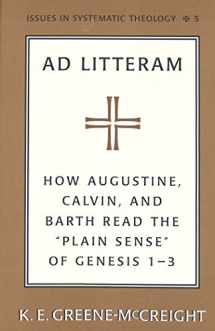
Ad Litteram: How Augustine, Calvin, and Barth Read the «Plain Sense» of Genesis 1-3 (Issues in Systematic Theology)
Book details
Summary
Description
One of the most complex problems in Christian interpretation of the Bible is the question of what constitutes a «plain sense» reading of scripture. This study breaks fresh ground by examining understandings of the plain sense of scripture along a trajectory represented by Augustine, John Calvin, and Karl Barth. Analyzing their readings of Genesis 1-3, Professor Greene-McCreight focuses on Augustine's De Genesi ad Litteram, libri XII, Calvin's Commentary on the First Book of Moses, and Barth's Church Dogmatics 3.1. The results of this investigation urge an ecumenically significant understanding of the plain sense of scripture: within this theological trajectory, reading according to the plain sense involves a negotiation between the constraints of verbal sense and the Rule of Faith.


We would LOVE it if you could help us and other readers by reviewing the book
Book review



